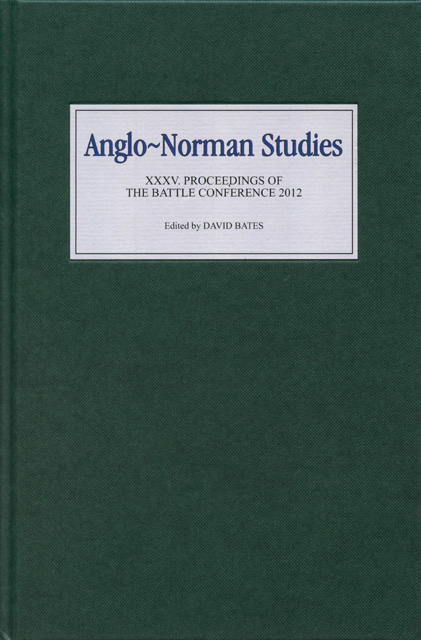Book contents
- Frontmatter
- Dedication
- Contents
- List of Illustrations and Tables
- Editor’s Preface
- Abbreviations
- A Three-Cornered Dynamic of Redemption in the ‘Long’ Thirteenth Century: Villein Manumissions and the Theology of the Incarnation (The R. Allen Brown Memorial Lecture, 2011)
- Femmes en religion, personnes d’autorité: les abbesses normandes (XIe–XIIIe siècles) (The R. Allen Brown Memorial Lecture, 2012)
- The Role of the Curator of the Bayeux Tapestry
- Early Normandy
- The Norman Conquest, Countess Adela, and Abbot Baudri
- Baldric of Bourgueil and the Flawed Hero
- John Bilson (1856–1943) and the Study of Anglo-Norman Romanesque
- The Identity of the Designer of the Bayeux Tapestry
- The Pseudo-Hugh Falcandus in His Own Texts
- The Thirteenth-Century Chronique de Normandie
- Les investitures abbatiales en Normandie: quelques réflexions autour du cas de l’abbaye du Bec-Hellouin (1034–1136)
- Robert Curthose: The Duke Who Lost His Trousers
- Sufficientia: A Horatian Topos and the Boundaries of the Self in Three Twelfth-Century Poems
- Aristocratic Acta in Normandy and England, c. 1150–c. 1250: The Charters and Letters of the Du Hommet Constables of Normandy
- Crime without Punishment: Medieval Scottish Law in Comparative Perspective
- Landscape and Belief in Anglo-Norman England
- Contents of Volumes 1–34
Crime without Punishment: Medieval Scottish Law in Comparative Perspective
Published online by Cambridge University Press: 28 February 2023
- Frontmatter
- Dedication
- Contents
- List of Illustrations and Tables
- Editor’s Preface
- Abbreviations
- A Three-Cornered Dynamic of Redemption in the ‘Long’ Thirteenth Century: Villein Manumissions and the Theology of the Incarnation (The R. Allen Brown Memorial Lecture, 2011)
- Femmes en religion, personnes d’autorité: les abbesses normandes (XIe–XIIIe siècles) (The R. Allen Brown Memorial Lecture, 2012)
- The Role of the Curator of the Bayeux Tapestry
- Early Normandy
- The Norman Conquest, Countess Adela, and Abbot Baudri
- Baldric of Bourgueil and the Flawed Hero
- John Bilson (1856–1943) and the Study of Anglo-Norman Romanesque
- The Identity of the Designer of the Bayeux Tapestry
- The Pseudo-Hugh Falcandus in His Own Texts
- The Thirteenth-Century Chronique de Normandie
- Les investitures abbatiales en Normandie: quelques réflexions autour du cas de l’abbaye du Bec-Hellouin (1034–1136)
- Robert Curthose: The Duke Who Lost His Trousers
- Sufficientia: A Horatian Topos and the Boundaries of the Self in Three Twelfth-Century Poems
- Aristocratic Acta in Normandy and England, c. 1150–c. 1250: The Charters and Letters of the Du Hommet Constables of Normandy
- Crime without Punishment: Medieval Scottish Law in Comparative Perspective
- Landscape and Belief in Anglo-Norman England
- Contents of Volumes 1–34
Summary
The origins and early history of the category of crime in Scotland have been identified in the increasing strength of royal justice from the reign of David I (1124–53) and the widening in the remit of royal legislation during the reigns of William the Lion (1165–1214) and Alexander II (1214–49). From the reign of David I, the jurisdiction of some major monastic institutions, founded either by David or his successors, was made explicitly subordinate to royal justice: if an abbot failed to do justice in his own court, the king would do it in his stead. During the reign of William, references survive to some offences explicitly heard by the king alone: murder, arson, rape, and robbery (theft with violence). Aristocratic justice remained important but worked alongside that of the king, according to the same legal norms. Royal charters from William’s reign also stressed that certain offences, including transgressions relating to the royal forest, unlawful poinding (seizure of goods for debt), and detention of another’s neyfs would put the perpetrator at the king’s mercy, where he would suffer plenaria forisfactura (‘full forfeiture’). These forfeitable offences were thus crimes in form even if not yet in name. Statutes enacted by Alexander II at Stirling in 1230 provide the clearest legal evidence of the king pronouncing on offences as against his own authority even though they did not affect his physical person. The statutes themselves underscored the very existence of crime as a socio-legal category in Scotland: the word ‘crime’ (Latin, crimen) appears in them for the first time. In 1244 Alexander issued a statute with force only in Lothian that described murder and robbery as felonies and also legislated on the offences of theft and homicide, thus confirming their existence as public crimes. This article will challenge this origin story of crime and provide a new assessment of the relationship between crime, punishment, compensation, and self-help in the kingdom of the Scots c. 1150–c. 1250.
The account above necessarily assumes crime to be an action defined by law as an offence against the state and the society that the former is supposed to protect. This definition of crime also assumes that actions categorized as crimes are punishable only by a central authority – the state, acting on behalf of the collective consciousness of society.
- Type
- Chapter
- Information
- Anglo-Norman Studies 35Proceedings of the Battle Conference 2012, pp. 287 - 304Publisher: Boydell & BrewerPrint publication year: 2013
- 1
- Cited by

